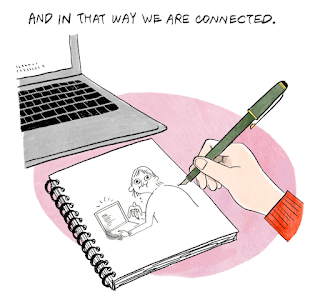Other than my own, there are few
traditionally published books whose inception and labor pains I have witnessed.
Today, a spectacular birthday to
one of these few is a cause for celebration.
The author, Tina Cho, is a
critique group colleague of many years. Neither of us had been published when
we started working together to improve our storytelling, and, since then, she has
risen to the top of the kidlit writers’ profession. Many published picture
books later, her
debut novel is being released *today*-- and a great day it is.
Re-named This Side of
Tomorrow, it began as a non-fiction picture book text about the two
Koreas, one filled with light and the other enveloped by darkness, seen from an
omniscient point of view. Our critique
group offered feedback, and all of us thought it would make a worthy picture
book.
Editors’ feedback suggested
re-writing it as a human story with survival of escaping from the dark Korea on
the north to the light Korea on the south. Our critique group saw that
manuscript as well.
A new editorial suggestion said it
needed to be a story for older readers, a middle grade novel. Tina wondered if
she could write a middle grade novel at all, having polished her skills on
shorter stories. She decided it was too important a story not to try. Tina and
her family were living in South Korea at the time, and she went on to research and
interview and learn from people who had made this harrowing journey.
Many months later, she had the
story. I was privileged to read that first or second draft and offer feedback. I
had published a middle grade that also had a historic and political backdrop,
so Tina thought I might be helpful. I don’t know if I was, but reading that excellent
draft, I became committed to following this story’s journey to publication.
First, Tina entered it into a competition,
and it won a prize from a good publisher and an offer to publish. It was not a
generous offer, but it already surpassed thousands of never-to-be published
middle grade novels languishing in writers’ computer files. Tina thought hard
as to whether to accept the offer. You know, “a bird in the hand is worth two
in the bush.”
She also pursued agent
representation, and, once she got an agent’s offer and accepted it, her new
agent thought they could do better.
And better they did, but not
before her agent suggested re-writing the story as a novel-in-verse and later, as a graphic novel, and a
lyrical one at that. I saw sections of that draft as well.
At every incarnation, it struck me
that a very good story was becoming a great and greater one.
Once acquired, the search for an
illustrator artist began. The publisher found a wonderful match for Tina’s
words in Deb JJ Lee. The long process of putting images to the words began.
And
beginning today, you can see and read it for yourself.
🔆{You
can read the starred Kirkus review in this link}🔆
















.jpg)




